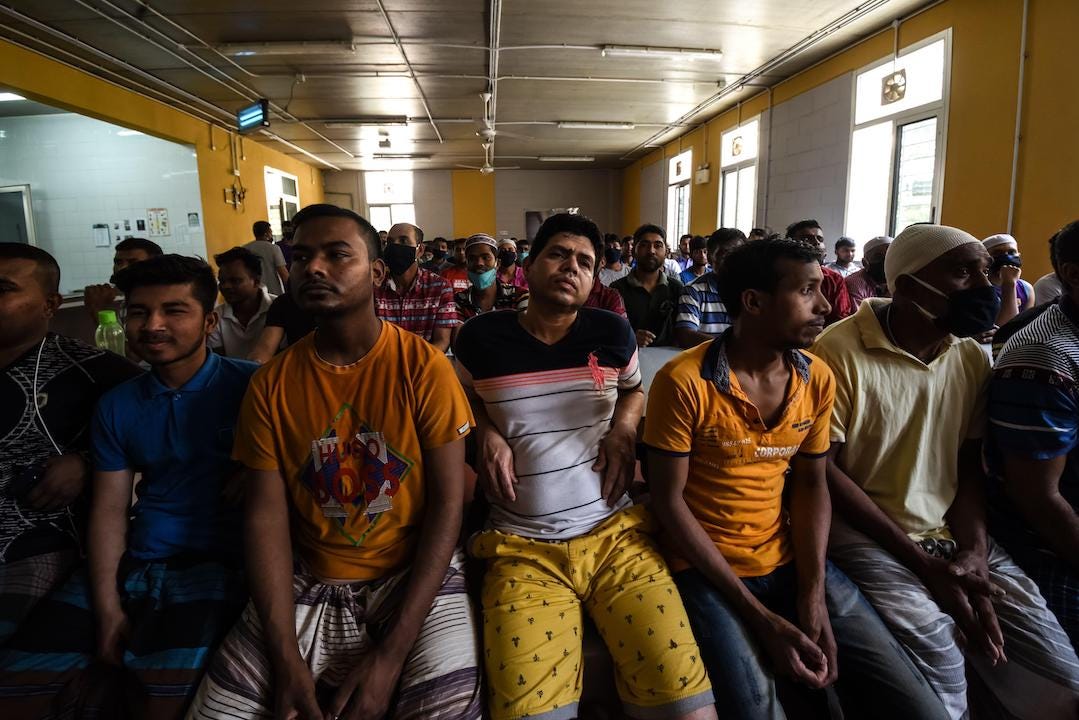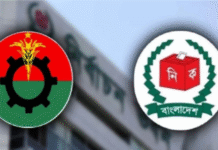
Who is tarnishing the image of the nation?
Is it the 81 Bangladesh migrant workers who paid about Tk 5 Lakh so that they could legally take up a promised job in Vietnam, and who protested outside the Bangladesh embassy when they found that no jobs were available?
Or is it the Bangladesh police who arrested these migrant workers when they returned to the country, and — in order to convince a magistrate to jail them — knowingly provided the court false information claiming that these men had been convicted of crimes in Vietnam?
The answer of course is the Bangladesh law enforcement officers who yet again — in addition, as Netra News has written much about, to their use of extra judicial killings and their systematic use torture — have traduced the country’s reputation.
In January and February 2020 dozens of Bangladesh workers went over to Vietnam with a promise of a job, and after following the official process required by the the government’s Bureau of Manpower, Employment and Training. When the men arrived, many found there were no jobs for them.
In early July, 23 of the men started protesting outside the Bangladesh embassy in Hanoi seeking assistance in repatriation back home — with the number protesting growing to over 100 in the course of a few weeks. The Bangladesh government did not like this — and they were accused of damaging the image of the nation through their protests. On August 18th, the Bangladesh government finally accepted that their stories were legitimate, and organised a flight to take 106 workers back to Bangladesh.— and on their return they were placed in two week Quarantine . However, on the day that they were supposed to go back home, they were taken directly to jail.
In its forwarding letter to the court — which appears to have heard the matter without a lawyer present — the police stated that “During their stay abroad” all these 81 men “were involved in various kinds of criminal activities” and “have already committed criminal offences and subsequently been convicted of those offences”. This was the key basis for the forwarding letter to argue that, “in order to protect safety and security to the citizens of Bangladesh, it will best to take legal action against them.”
However, these men were never prosecuted or sentenced for any criminal offence in Vietnam.
Whilst it is widely known that Bangladesh police are highly inventive when they draft First Information Reports and other documents to the courts, it is shocking that they would lie in such a blatant manner, evident for everyone to see. Deliberately misleading the court in this fashion must surely be a contempt of court.
Also guilty of ‘tarnishing the image of the nation’ was the magistrate who went along with the police in ruling that the men should be jailed without taking the most minimal efforts of verifying any of these police claims, the politicians who would have facilitated this course of events, and of course the recruiting agencies who sent the men to Vietnam on false pretences.
Those actually upholding the image of the Bangladesh were of course the 81 men — who went through the legal routes to get a job overseas, no doubt putting their families in great debt to pay for the fees, and simply protested the absence of work for them.
Yet this did not stop Bangladesh government representatives, from claiming otherwise. “Their criminal activities have tarnished the country’s image and also put a negative impact on the labour industry,” a sub-inspector of police had the temerity to claim, echoing what other government officials had previously said about the men’s protests outside the Bangladesh embassy in Vietnam.
In a blistering article in The Daily Star, its editor Mahfuz Anam, highlighted the absurdity of the treatment of the migrant workers.
“On the one hand, we are so eager to lay our hands on [migrant workers] hard-earned foreign exchange … But when it comes to helping our workers who are exploited, cheated, beaten, tortured, thrown out of jobs, or never given the job that was promised or at the level of pay promised, we turn our face away as if they don’t exist and we even have the temerity to jail them when they — after indescribable hardship — manage to return home. On what grounds? “They have tarnished the image of the country.” The realm of the absurd appears to have no bounds when it comes to official justification to incarcerate ordinary and poor citizens. The case of expatriate workers is especially ironic because we so greedily seek the money they send home.”
The courts should immediately release these 81 men — and those responsible for their imprisonment should hold their heads in shame. It is they, not the migrant workers, who are tarnishing the image of the nation.
//DB









